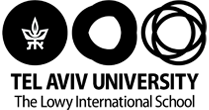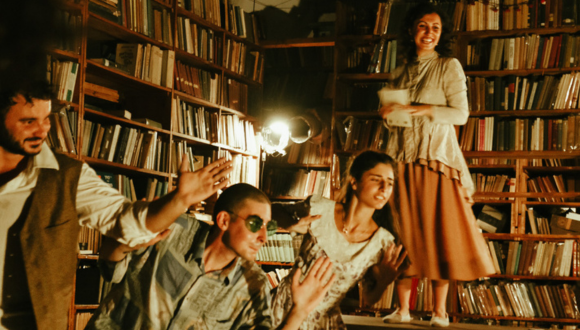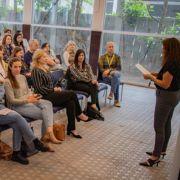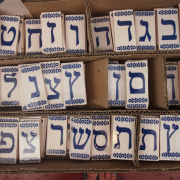More Than a Language: The Yiddish Summer Program at TAU
Learn Yiddish and dive into history, heritage, and community!
Would you like to experience the true meaning of kvell—the joy and pride that make you so happy you can’t sit still? Come study Yiddish at Tel Aviv University this summer! The Yiddish Summer Program invites students from all backgrounds to immerse themselves in the language, history, and traditions of Yiddish-speaking communities. The program will run from July 8 to July 31 and the applications are already open.
For Lasha Shakulashvili, an invited lecturer of Yiddish Language and Culture at Tbilisi State University in Georgia, this program was a transformative experience—one that set him on a path to re-introducing Yiddish education in his country. He participated in TAU's Yiddish program twice, in 2021, and 2022, and in this interview, he talks about how discovering his passion for Yiddish—and the support he received from Tel Aviv University—helped him turn his dream into reality.
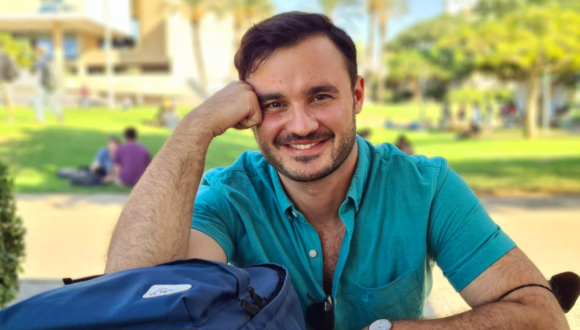
Lasha Shakulashvili on Tel Aviv University campus
—What motivated you to choose a TAU program?
When I understood that I wanted to start a Yiddish program in Tbilisi, I sent an email to Tel Aviv University, to The Jona Goldrich Institute for Yiddish Language, Literature and Culture, asking to join their Yiddish program. They accepted me with a scholarship, even though I didn’t know any Yiddish at that time.
They believed in me and gave me the opportunity to study, so I came to Israel and spent six hours a day studying Yiddish. This is what’s special about TAU—it will give you a chance if they see that you have a drive.
—What were the highlights of the program for you? What can you tell us about your experience at TAU and in Tel Aviv?
I didn’t expect the classes to be so practical and exciting: we had cooking classes in Yiddish, cemetery tours, singing classes, theater performances—everything that makes you fall in love with the language.
What Tel Aviv University actually taught me during those sessions is that if you want people to value your work as an academic, your product has to be accessible outside the classroom as well.
We also had a seminar where graduates who were ahead of us presented their projects. It was very inspiring. It is also important for me that Tel Aviv University always stays in touch with alumni by sending news updates and invitations to online events.
Apply now for the Yiddish Summer Program to gain a unique insight into Jewish culture!
—Did studying at TAU help your career, and how?
I can simply say that without Tel Aviv University, my career as a Yiddish scholar would have never happened. I feel a lot of support from the university in what I do.
In 2023, my students came to Israel for the summer program–thanks to scholarships from TAU. They even put on a performance in Yiddish here. What’s more, I followed the example of my first Yiddish teacher at TAU, Yaad Biran, who does walking tours in Yiddish, and started offering such tours in Georgia, which have become quite popular.
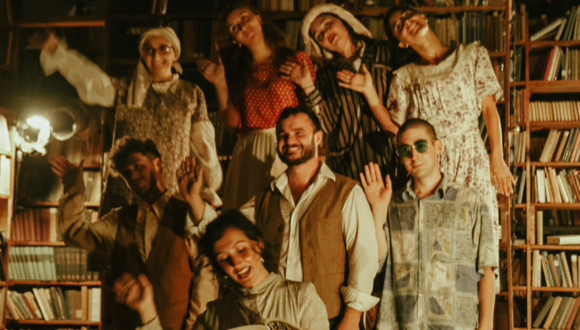
Taking Yiddish to the stage: summer program students put on a performance in Yiddish
Now I'm often seen as a bridge between ethnic Georgians and Georgian Jews in my country because I am extremely connected to the Jewish community in Tbilisi—I give lectures and run a very active Facebook page where I write about my research in Georgian. Last December, the Jewish Council of Georgia gave me a special award for outstanding contributions to Georgian-Jewish relations.
I have also just recently finished translating Isaac Bashevis Singer's Magician of Lublin from Yiddish to Georgian, to be published in Georgia very soon.
—What is the essence of your professional work?
I teach Yiddish as part of the Jewish Studies BA at Tbilisi State University. My course is very successful because it goes way beyond language; it’s also about history and culture.
Starting to offer a Yiddish course as part of the Jewish Studies curriculum was actually my idea because I wanted to bring Yiddish back to Georgia. Tbilisi used to have a very vibrant Yiddish-speaking Jewish life in the 19th century because it’s a very Jew-loving country. The first Jewish schools in Georgia were created by Ashkenazi Jews, and they were all in Yiddish. But in 1922 Yiddish disappeared in Georgia–after all the schools were closed on the orders of the new Soviet government.
I was raised by an Ashkenazi Jewish teacher, who made me and my brother grow up with a lot of love for the Jewish people while also learning English and Russian languages. As children, we used to sing in Yiddish with her, so this language has always lived in the back of my head. I regard her as my godmother now.
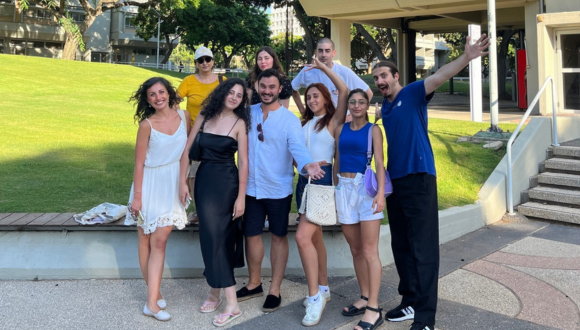
Lasha Shakulashvili (center) with his classmates in Tel Aviv
When the pandemic happened, I told myself, ‘You will either try to make a miracle and bring Yiddish back to Georgia, or you will probably be one of the last people in Georgia who will have any memory of Yiddish.’
So exactly 100 years later, in 2022, I made Georgia the only place in the world where in order to get a degree in Jewish studies, it is compulsory to study two Jewish languages, Hebrew and Yiddish.
—Tell us a bit more about your project.
My project is not just about teaching Yiddish as a language but also about integrating Jewish history into Georgia’s narrative. I’m not Jewish, so I am teaching the Jewish heritage of Georgia as an integral part of the history of Georgia.
There is no history of Europe without Yiddish and Jewish people. You cannot teach the history of Europe without teaching the history of the Ashkenazi Jews and Yiddish.
I organize a lot of study tours using cemeteries, museums, and theaters as teaching spaces. For example, if we’re studying the history of Yiddish theater, I take my students to where the Yiddish theater used to be in Tbilisi.
Before teaching my first Yiddish class, I invited national TV to my home to show them how I bake traditional “Alef-beys” (Hebrew alphabet) cookies marking the start of the academic year. There used to be a tradition in Jewish schools in Tbilisi that the teacher, together with the rabbi, would give such Yiddish alphabet cookies to children so that their first connection with Yiddish and the school was sweet.
The excitement around this made my students more motivated, and it brought Yiddish back into the public eye.
—Why is it important to teach and study Yiddish?
I think it is very important to understand that before the state of Israel was established, there were a great many Jewish worlds. For me as a non-Jew who is a scholar of Jewish studies, Israel is a reunion party for all Jewish people where an Ashkenazi can see a Mizrahi Jew maybe for the first time in their life.
I want people to see that there is Yiddish culture, which is completely different from Israeli culture. Yiddish expressions do not make it into Israeli culture and cannot be adequately translated. There is a word kvell for example, which means that you're so happy that you just cannot sit still, but it's not your own happiness that makes you so excited–you're happy for someone else.
We, scholars of Jewish studies who study Yiddish, believe that by opening Yiddish programs we give access to the Jewish world that existed once upon a time.
Whenever we say ‘never again’, teaching Yiddish makes sure that it's truly ‘never again’ because we understand what was lost when we study Yiddish. It was not just people who were massacred in the Holocaust; there was a whole culture that was destroyed. Recognizing the language means that you not only accept the language, but you give autonomy and credit to the whole culture.
Apply now for the Yiddish Summer Program to gain a unique insight into Jewish culture!
